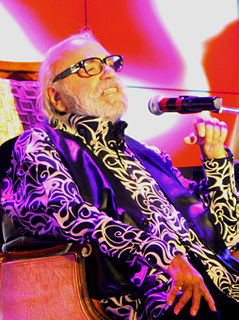A Quote by Donald E. Williams, Jr.
This man, although he may not actually have committed the crime attributed to him, is nevertheless morally culpable, because he is the enemy of our existing institutions
Quote Topics
Related Quotes
To punish a man because he has committed a crime, or because he is believed, though unjustly, to have committed a crime, is not persecution. To punish a man, because we infer from the nature of some doctrine which he holds, or from the conduct of other persons who hold the same doctrines with him, that he will commit a crime, is persecution, and is, in every case, foolish and wicked.
Every time a crime was committed by a Muslim, that person's faith was mentioned, regardless of its relevance. When a crime is committed by a Christian, do they mention his religion? ... When a crime is committed by a black man, it's mentioned in the first breath: 'An African American man was arrested today...' But what about German Americans? Anglo Americans? A white man robs a convenience store and do we hear he's of Scottish descent? In no other instance is the ancestry mentioned.
A man who gives way to his passions is like a man who is shot by an enemy, catches the arrow in his hands, and then plunges it into his own heart. A man who is resisting his passions is like a man who is shot by an enemy, and although the arrow hits him, it does not seriously wound him because he is wearing a breastplate. But the man who is uprooting his passions is like a man who is shot by an enemy, but who strikes the arrow and shatters it or turns it back into his enemies heart.
Suppose that I see a hungry child in the street, and I am able to offer the child some food. Am I morally culpable if I refuse to do so? Am I morally culpable if I choose not to do what I easily can about the fact that 1000 children die every hour from easily preventable disease, according to UNICEF? Or the fact that the government of my own "free and open society" is engaged in monstrous crimes that can easily be mitigated or terminated? Is it even possible to debate these questions?
When human beings are regarded as moral beings, sex, instead of being enthroned upon the summit, administering upon rights and responsibilities, sinks into insignificance and nothingness. My doctrine then is, that whatever it is morally right for man to do, it is morally right for woman to do. Our duties originate, not from difference of sex, but from the diversity of our relations in life, the various gifts and talents committed to our care, and the different eras in which we live.
What do you really want to know? Am I sorry for what I did? There's not a day goes by I don't feel regret. Not because I'm in here, but because you think I should be. I look back on the way I was. A young, stupid kid that committed that terrible crime. I want to talk to him. I want to try to talk some sense to him. Tell him the way things are. But I can't. That kid's long gone, and this old man is all that's left.
An enemy, Ender Wiggin," whispered the old man. "I am your enemy, the first one you've ever had who was smarter than you. There is no teacher but the enemy. No one but the enemy will tell you what the enemy is going to do. No one but the enemy will ever teach you how to destroy and conquer. Only the enemy shows you where you are weak. Only the enemy tells you where he is strong. And the rules of the game are what you can do to him and what you can stop him from doing to you. I am your enemy from now on. From now on I am your teacher.
there was no crime in unconscious plagiarism; that I committed it everyday, that he committed it everyday, that every man alive on earth who writes or speaks commits it every day and not merely once or twice but every time he open his mouth… there is nothing of our own in it except some slight change born of our temperament, character, environment, teachings and associations




































